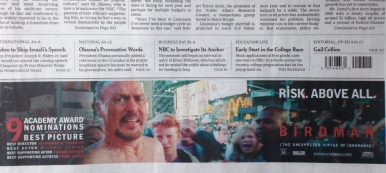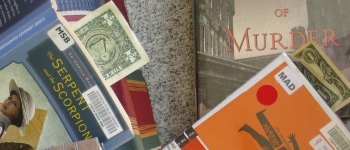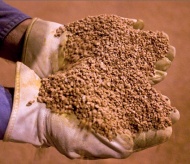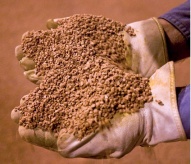This ad for the movie, Birdman, appears at the bottom of today’s national edition of the New York Times. After I get past Michael Keaton’s expression, I am attracted by the brightest accent of color in the ad, the McDonald’s arches. Read More
After I get past Michael Keaton’s expression, I am attracted by the brightest accent of color in the ad, the McDonald’s arches. Read More
Who Owns Who? part 3
This is from Bloomberg, June 13, 2014
Buy Organic, Help Big Food by James Greiff
“Enjoy eating Stonyfield yogurt, which bills itself as “Obsessively Organic“? It’s owned by Danone SA, a Paris-based company that posted sales of 21 billion euros ($28 billion) last year. You wouldn’t know this by reading the packaging label or visiting Stonyfield’s website, which tells visitors “We’re still located right here in New Hampshire” beneath a picture of a cow loping along a country road.
. . .
Naked Juice (PepsiCo Inc.), Odwalla juices and fruit bars (Coca-Cola Co.), Cascadian Farm cereals and prepared foods (General Mills Inc.)”
Regulatory vacuum and housing boom
This is from an October 27, 2013 Reuters story about the Egypt Steel Company hoping to build more capacity to meet increased demand.
After being rattled first by the idea of a regulatory vacuum as being good for the housing developers if not tenants, I then rattled myself further by the thought of low-cost steel mills built in such a vacuum.
I have no knowledge of how good the building codes are in Egypt or how well or poorly they were once enforced.
Giving by the Book. I’d be Fine with that. Part 3: kinda off point
As I was thinking through this idea, I wondered if libraries would be concerned that people who were donating a little something per book would be resented by borrowers next in line who were choosing not to. Then the Madison Public Library began offering a Limited Edition library card for a $25 donation.
It’s black vs the usual orange.
I decided that the library must not be too worried that feelings might run high in the checkout line. It’s not quite the same as paying for the loan of a book, but flashing the black still says I’m supporting the library and you orange(!)
continue reading Part 3 & see the “Mistress of the Art of Death” library card
.
Giving by the Book. I’d be Fine with that. Part 2: Why Not?
Why this separation of giver and reader? Why can’t you borrow a book and support the library at the same time?
Is it to do with the beginnings of free public libraries? . . .
Is it a legal question? Separation of Library and Foundation? . . .
Is there a slippery slope here? . . .
Would the amount raised be worth it? . . .
How much would someone give? . . .
So, what does it cost the library per book to lend me any one of Crowner John’s dour investigations? . . . continue reading Part 2
Giving by the Book. I’d be Fine with that. Part 1: What?

I want to donate to my public library through my library card. Give something per book like a rental. Or per day like a late fine except that it starts accruing when I check a book out. The accounting should be easy since all library computer systems can do fines, and most can handle rentals.
It costs the library something per book to lend (more on this in Part 2), so giving something per book borrowed makes sense to me.
Why shouldn’t fundraising start among the people who actually use the library? For NPR, it starts among the listeners. continue reading Part 1
Who is this man? Why is he bumming?

Is he a SAC portfolio manager just indicted for insider trading?
Is he a major league outfielder who just learned of his 50 game suspension for using PED’s from the BioGenesis Clinic?
Is he a job seeker in a job fair line in Emeryville, Ca?
Is he brooding on whether it’s his shoes that squeak?
Is he “a conservator of classic soul” music listening to a photographer telling him to look it?
New York Times photo by Chad Batka copyright 2013
Jiggling My Faith in Public Radio
A couple of months ago, I got a strange call from Wisconsin Public Radio. We give them a couple of dollars every month. They called to thank us so much. They were wondering if, for their upcoming pledge drive, they could make our donation that month part of a challenge grant. You know, “generous members of WPR have offered a challenge grant this hour. Help us make our goal!”
I asked, “So, if listeners don’t give enough that hour to meet the challenge goal, I don’t give you any dough this month?”
“Oh, no, you don’t have to do anything; we’d just include it as part of our pitch,” she explained with that kindergarten teacher voice that some Midwesterners have.
“But where’s the challenge? You get my money if you meet the goal or not.”
“The challenge is to meet the goal that’s set,” she said.
Oddly, this reminded of this gadget I owned once that broke and whose guarantee against breakage, I found out, was a sincere apology.
“But WPR has nothing at stake,” I said. I was getting suspicious and starting to listen quite shamefully for a hint of Eastern European accent underneath the Betty Crocker lilt. I was wondering if she was going to ask me to “confirm” my credit card info if I agreed to go along with her pitch.
“The challenge is for the listeners.”
“I don’t know. It sounds kinda funny. Do you tell listeners that you still get the challenge money if they don’t come across?”
“I don’t think so, sir, but each challenge is different.”
In the end, I said no, and hung up. The thing is: the challenge was going to be from anonymous monthly supporters; I wondered why they even bothered to ask anyone’s permission. Why jiggle my faith in one of the few organizations I like to be naive about?
Dancing With Myself! More who owns who.
Potash Corporation of Saskatchewan (POT) is the world’s largest miner of potash, a main ingredient of many fertilizers. POT appears to sell potash to itself.
It sells potash to customers outside North America through Canpotex, a legal cartel owned by POT with its chief North American rivals, Agrium and Mosaic.
Canpotex’s an old story. Been around since 1972. What’s fascinating is that POT also owns 22% of Sinofert Holdings Ltd, a big Chinese potash importer.
Sinofert is one of Canpotex’s biggest customers. Indeed, on December 31, 2012, Canpotex and Sinofert concluded some very tough negotiations. The Globe and Mail’s article led off with the line “Canada’s potash cartel has blinked.”
Canpotex had to drop the price to $400 a tonne from the March price of $470.
The Globe quoted one exec, “The Chinese are very good negotiators and always have been [ . . .] And they are very good customers.”
It must get so confusing to negotiate. “Let me call my owners and get back to you. You want to talk to your owners before I hang up?”
Or the road to that final compromise. “They say your final offer is $390. You say your final offer is $410. Do you want us to ask them to ask you to split the difference with you? Are you OK if you split the difference if they say you agree?”
It must be like trying to thumb wrestle with yourself.
Did you know this company is owned by that one?
This is an ongoing list of companies whose connection surprise me. Often, it is a subsidiary of a large corporation that I thought was a private company.
AbeBooks is a subsidiary of Amazon. Founded in 1995, this online marketplace for book stores was sold to Amazon in 2008. AbeBooks is listed with many of Amazon’s other subs at the bottom of their main page. AbeBooks, however, does not mention Amazon on its front page. Amazon gets its due on AbeBooks’ Privacy Policy page.
One of the regular booksellers that comes up when searching for a book on Abebooks is The Book Depository, which bills itself as “the UK’s largest dedicated online bookseller.” The Book Depository is also owned by Amazon and like AbeBooks is listed on Amazon’s main page. When looking at a book on AbeBooks that is offered by The Book Depository, I wasn’t readily able to figure out that the two were related much less that both were owned by Amazon.
While The Book Depository website does mention Amazon on its About Us and Privacy Policy pages, neither Amazon nor AbeBooks rates mention on its main page.
goodreads, a booklovers’ website, was bought by Amazon.com in 2013. Neither mentions the other on their main pages. goodreads doesn’t mention Amazon on its Privacy Policy page, but their new owner does merit reference on the company blog.
Kashi cereals and snack bars and Bear Naked granola are Kellogg brands. Founded in 1983, Kashi was bought by Kellogg in 2000. Bear Naked began in 2002 and was sold to Kashi in 2007. Thus, Bear Naked is a sub of Kashi, which is a sub of Kellogg. See Kellogg 2011 10K p 4 brand list and p 76 for subsidiary list. See Kellogg 2007 10K note 2, p 38 for information on Kashi’s purchase of Bear Naked.
The Privacy Policies of both Kashi and Bear Naked acknowledge their Kellogg’s connection. Otherwise, their websites are sparing in their reference to their owner. The pages where they detail their histories focus on other things. Kellogg’s website also has little space for Kashi or Bear Naked.
.
I revised this post in mid February, 2014. My assertions are based on the version of various websites on view at that time unless otherwise noted.




